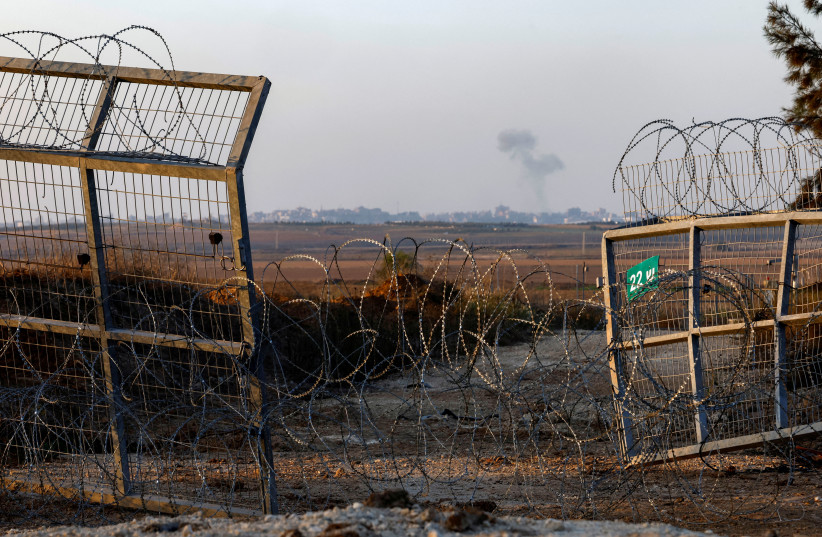On a gray February morning, a delegation of staff, management, and faculty from Reichman University embarked on a journey to Kibbutz Kfar Aza, around 5 km. east of the Gaza border, which was ravaged by Hamas terrorists on October 7, 2023.
Sixty-two people were killed on this kibbutz. That’s out of a population of around 900. Nineteen were taken hostage, including Alon Shamriz and Yotam Haim, who were tragically killed by IDF troops in a case of mistaken identity on December 15.
Reichman University mobilized early on in the war, offering evacuees from Kfar Aza a home in the newly constructed Ronson dormitory on campus. One hundred evacuees from the South are currently staying in the Reichman dorms, forging a bond with the university and its community. Prof. Uriel Reichman fought fiercely with authorities to make this happen.
A pioneer of agricultural irrigation technologies, Kfar Aza was among the hardest hit communities in savage attacks of October 7.

“Before going into my personal narrative, it’s imperative to address the ongoing nightmare of 136 [now 134] hostages still held in Gaza. Their immediate and safe return must be ensured,” said Ido Felus, 24, a Kfar Aza resident and student of business administration and entrepreneurship at Reichman University.
On October 7, Felus and his family found themselves surrounded by Hamas terrorists who had set up a command and sniper post on the roof of their house and had encamped in Felus’ yard.
The Felus family survived by barricading themselves in their bomb shelter, enduring a grueling 24 hours without food or water. They were eventually rescued by the advancing IDF forces. At their local gas station, they met up with other survivors and began to truly understand the extent of what had occurred on their beloved kibbutz.
Felus was soon after drafted into the new civil guard of the kibbutz.
Rotem Koren, a third-year law and business administration student, whose parents now reside as evacuees in the Ronson dormitory, endured a terrifying ordeal when terrorists breached his family home. Just waking up in his Tel Aviv apartment, Rotem watched in horror as his family’s plight unfolded through distressing family WhatsApp group messages.
“I acted on autopilot, busy coordinating and directing forces to the area – understanding that many were killed from the civilian armed guard and IDF troops. I thought about how I could help and not collapse in the face of uncertainty. After many phone calls, I managed to reach an IDF unit that was at the kibbutz. In a conversation with the unit commander, I directed them to my parents’ house. When they arrived, they saw my family’s house burning. They thought there would be no one to save, and I, unaware of the condition of the house, insisted and asked them to go to the window of the safe room and shout ‘Rotem Koren,’ so my parents would understand that help had come. They exited through the safe room window.”
Koren’s Reichman University flatmate and classmate, Guy Assor, also from the kibbutz, found himself thrust into the nightmare of October 7. His family, hiding in their home, awaited rescue until the following morning.
“It was a miracle that the terrorist went up to the roof and did not see my mother and sister hiding downstairs.”
Subsequently, Assor was drafted into the army and stationed a mere kilometer away from his beloved kibbutz in Gaza’s Shejaiya neighborhood.
“I was able to see my kibbutz from the places [where] I fought. It gave me a great sense of mission and also shock, to comprehend where the terrorists who murdered so many, came from.”
NETA KESSLER, a second-year sustainability and government student, was trekking through Nepal when he was awakened on October 7 by news from his family that he received via rare Internet service. He discovered that his family, including his baby nephew and niece, were hiding in their safe room while hundreds of terrorists roamed the kibbutz freely. Thousands of miles away, Kessler immediately began making plans for his five-day trip home, a grueling and depressing journey that included hiking down a mountain, walking for days, and flying by helicopter and plane.
“On that fateful day, I lost many dear friends and neighbors who were either murdered or taken captive from their own homes, where they should have felt safest,” said Kessler.
'Sense of security shattered'
“[What happened on] our once peaceful kibbutz, now a scene of bloodshed and pain, has shattered our sense of security. With friends and family still in captivity at the hands of terrorists for over 120 days, the urgency to bring them home is paramount. We await the return of kibbutz friends Gali, Zivi, Emily, Doron, Keith, and my very good friend and university classmate Idan Shtivi – refusing to rest until they are reunited with their families and friends.”
Kessler volunteered for the Armored Corps and has since served as a tank driver for over three months.
Felus, Koren, and Asser were discharged and have returned to the campus to pick up where they left off.
“I am so grateful to be back studying and can really feel the embrace and support of the university,” said Felus. Despite the trauma of what he and his family went through, Felus insisted, “For me, Kfar Aza will always be my home and I will eventually come back to my home.”
The writer is head of the Raphael Recanati International School, and vice president for external relations at Reichman University.
